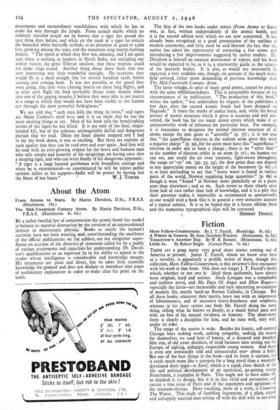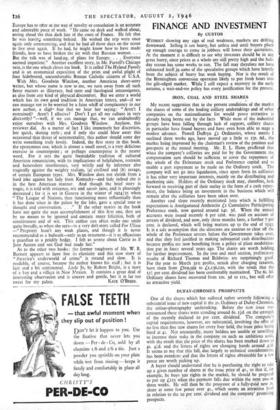Fiction
More Fellow-Countrymen. By J. T. Farrell. (Routledge. 8s. 6d.) Little Jo. By Robert Bright. (Cresset Press. 7s. 6d.)
THERE are a great_ many very good short stories coming out of America at present. James T. Farrell, whom we know over here as a novelist, is apparently a prolific writer of them, though this collection, More Fellow-Countrymen, is this reviewer's first encounter with his work in that form. One does not forget J. T. Farrell's books which, whether or not one hi- liked them uniformly, have always been original, hard and serious. Studs Lonigan was a remarkable and ruthless novel, and My Days Of Anger and Ellen Rogers— especially the latter—are memorable and very interesting re-creations of modem life, mostly hard-up Roman Catholic, in Chicago. But all these books, whatever their merits, leave one with an impression of laboriousness, and of excessive heavy-fistedness and emphasis, whereas in his short stories one finds Mr. Farrell doing the same thing, telling what he knows so deeply, at a much better pace and with no loss of his natural vividness or honesty. The short-story form is clearly a discipline for him, and he runs well, very well, under its yoke. The range of the stories is wide. Besides his frantic, self-centred Chicago boys seeking work, seeking sympathy, seeking the reason for themselves, we read here of boxers, of a decayed and drunken film star, of old street derelicts, of tired business men setting out for Europe, of sighing, unhappy, respectable young women. And there is even one awkwardly told and unsuccessful store" about a baby. But one of the best things in the book—and its form is curious, for it reads much more like a synopsis for a long novel than a normally developed short story—is Sorel, which is a rapid, close sketch of the life and political development of an egotistical, go-getting young Frenchman, a journalist izi-Paris. This ought not to have come off, so slapdash is its design, but it is in fact vivid and persuasive, and carries a true sense of Paris and of the arguments and agitations of the nineteen-thirties. More touching, more of a story, is Counting The Waves. This study of fumbling frustration, of a plain, stupid and unhappily married man setting off with his dull wife to see what Europe has to otter in the way of novelty or consolation is an accurate and admirable piece of work. " He came on deck and walked about, seeing ahead the thin dark line of the coast of France. He felt that he was leaving something behind. He wished the trip were once again only commencing, and that he had all those days on the ocean to live over again. If he had, he might know how to have made friends, how to have broken the ice with that Russian woman. . . . But the talk was of landing, of plans for Europe. . . . Everyone seemed impatient." Another excellent story, in Mr. Farrell's Chicago vein, is the one which closes the book. It is called The Hyland Family and is an economical exposition of the prim and awful plight of four hidebound, uncomfortable Roman Catholic citizens of U.S.A.
With Mrs. Goodwin Winslow, another American short-story writer, but whose name is new to me, we turn away from all such fierce matters as illiteracy, bad taste and theological intransigence, as also from any kind of physical discomfort. But we enter a world which has its own good tradition in American letters, and—if we can manage not to be worried by a faint whiff of complacency in our new author, a sligl•t fear that we hear her saying: "Aren't I restrained? Aren't I allusive? Don't I get all my culture in very discreetly? "—well, if we can manage that, we can undoubtedly enjoy ourselves with Mrs. Goodwin Winslow. Anyhow, this reviewer did. As a matter of fact I like immensely her discretion, her quick, skating style ; and if only she could blow away this occasional thin threat of sentimentality, this author should some day write something truly lovely. Indeed, the first story in this book, the eponymous one, which is almost a small novel, is a very delicious exercise in counterpoint ; or perhaps counterpoise is the nearer word. For it sets the quite formidable tradition of cultured American romanticism, with its implications of helpfulness, restraint and benevolent interference, very wittily and by inference also tragically against the weighty realism, (a) civilised and (b) savage, of certain European types. Mrs. Winslow does not shrink from a hard joke against her lady from Kentucky—and lady indeed she is in the best American manner. And though the brief story is tragic, it is told with reticence, wit and savoir faire, and is pleasingly decorated ; for it is set in Geneva in the winter of 1924/25 when "The League of Nations, then functioning more influentially than it has done since in the palace by the lake, gave a special tone to thought and conversation. . . ." If the other stories in the book have not quite the neat accomplishment of this first one, they are by no means to be ignored and contain many felicities, both of sensitiveness and of wit. This author can often make one smile quite broadly, as when she says—in a very deft story called For Ulisse —" Propriety hasn't any weak places, and though it is never recommended as a bulwark—only as an ornament—it is as efficacious a guardian as a prickly hedge. I felt as serene about Carrie as if Jane Austen and not God had made her."
As to the other two books : the former toughness of Mr. W. R. Burnett appears to have lost its elasticity and this new story of " America's underworld of crime" is rotund and slow. It is readable, of course, because the author knows his stuff ; but it is lazy and a bit sentimental. Little Jo, by Robert Bright, is a story of a toy and a village in New Mexico. It contains a great deal of interesting observation and is sincere and gentle, but it is far too



























 Previous page
Previous page